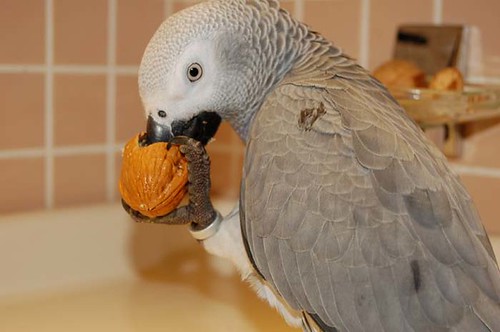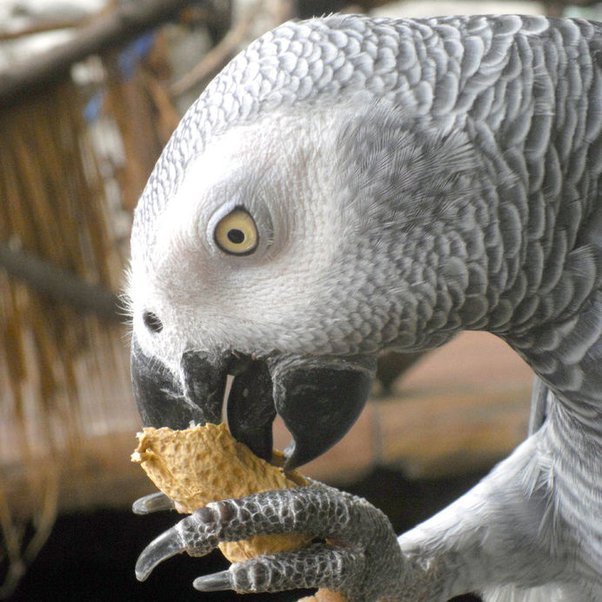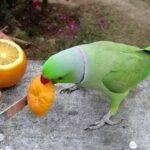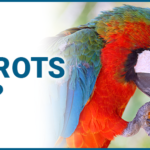Yes, parrots can eat almonds. Almonds are safe and nutritious for parrots in moderation.
Parrots thrive on a varied diet that includes nuts like almonds. These nuts provide essential nutrients such as protein, healthy fats, and vitamins. Almonds contribute to a parrot’s overall health, supporting strong muscles and a shiny plumage. Always offer almonds in their natural, unsalted form to avoid any harmful additives.
Remember to serve them in moderation, as excessive consumption can lead to weight gain and other health issues. A balanced diet, including fruits, vegetables, and grains, ensures that parrots receive all necessary nutrients. Monitoring portion sizes helps in maintaining optimal health and well-being for your feathered friend.
Credit: www.quora.com
Nutritional Value Of Almonds
Almonds are a popular snack packed with essential nutrients. They offer a range of health benefits not just for humans, but also for parrots. Understanding the nutritional value of almonds can help you decide if they are a good addition to your parrot’s diet.
Vitamins And Minerals
Almonds are rich in several vitamins and minerals. They provide Vitamin E, which is a powerful antioxidant. Almonds also contain B vitamins such as riboflavin, niacin, and folate.
Here is a table outlining the key vitamins and minerals found in almonds:
| Vitamin/Mineral | Amount per 100g |
|---|---|
| Vitamin E | 25.63 mg |
| Riboflavin (B2) | 1.014 mg |
| Niacin (B3) | 3.385 mg |
| Folate (B9) | 44 µg |
| Magnesium | 268 mg |
Health Benefits
Feeding almonds to parrots can offer various health benefits. The high Vitamin E content helps to boost their immune system. Magnesium supports bone health and muscle function. B vitamins assist in energy production.
Here are some specific health benefits:
- Vitamin E: Enhances immune function and skin health.
- Magnesium: Supports strong bones and muscles.
- B vitamins: Help convert food into energy.
Almonds also contain healthy fats which are good for parrots’ heart health. Always feed in moderation to avoid excessive calorie intake.

Credit: pangovet.com
Are Almonds Safe For Parrots?
Parrots are curious eaters, and almonds are often a popular treat. But are almonds safe for your feathered friends? It’s important to understand the potential risks and toxicity concerns before feeding almonds to parrots.
Potential Risks
Almonds can pose several potential risks to parrots:
- Choking Hazard: Whole almonds can be a choking hazard for small parrots.
- High Fat Content: Almonds are high in fat. This can lead to obesity in parrots.
- Salted Almonds: Never feed salted almonds to parrots. The salt is harmful to them.
Toxicity Concerns
Not all almonds are created equal. Some almonds can be toxic:
- Bitter Almonds: Bitter almonds contain cyanide. This is toxic to parrots.
- Sweet Almonds: Sweet almonds are generally safe. But moderation is key.
It’s crucial to be cautious and informed. Always choose the safest options for your parrot.
How To Feed Almonds To Parrots
Feeding almonds to parrots can be a healthy treat. Almonds provide essential nutrients and vitamins. To ensure your parrot benefits, follow these guidelines.
Preparation Tips
Preparing almonds for parrots is simple. Follow these steps:
- Choose raw, unsalted almonds. Avoid roasted or flavored almonds.
- Soak almonds in water overnight. This softens them for easier digestion.
- Peel the almonds to remove the skin. The skin can be tough for parrots.
- Chop almonds into small pieces. This prevents choking hazards.
Serving Size
Almonds should be given in moderation. Here’s a guide:
| Parrot Size | Almonds Per Week |
|---|---|
| Small (e.g., Budgies) | 1-2 pieces |
| Medium (e.g., Cockatiels) | 3-4 pieces |
| Large (e.g., Macaws) | 5-6 pieces |
Always observe your parrot’s reaction to new foods. Introduce almonds gradually.
Maintain a balanced diet. Almonds should not replace regular food.

Credit: birdtricksstore.com
Alternatives To Almonds
Parrots enjoy a variety of nuts, but almonds may not always be the best choice. It’s essential to explore alternatives that are both safe and nutritious for your feathered friend. Below, you’ll find some excellent options and treats that can keep your parrot healthy and happy.
Other Nut Options
There are several other nuts that parrots can safely enjoy. Here are a few:
- Walnuts: Rich in omega-3 fatty acids, promoting brain health.
- Pistachios: Packed with fiber and antioxidants, easy to crack open.
- Pecans: High in healthy fats, supporting heart health.
- Cashews: Source of protein and essential minerals like magnesium and copper.
Safe Treats
Besides nuts, there are other safe treats for your parrot. These options provide variety and essential nutrients:
| Safe Treat | Benefits |
|---|---|
| Fruits | Vitamins and natural sugars for energy. |
| Vegetables | Fiber, vitamins, and antioxidants. |
| Seeds | Protein and healthy fats. |
| Grains | Carbohydrates and essential nutrients. |
Some safe fruits include apples, berries, and bananas. Vegetables like carrots, broccoli, and spinach are excellent choices. Seeds such as sunflower and pumpkin seeds are also good options. Grains like quinoa and oats can be added to their diet.
Ensure treats are given in moderation to maintain a balanced diet. This way, your parrot can enjoy a variety of foods without health risks.
Signs Of Almond Allergies
Parrots love to eat a variety of foods, including nuts. But can they eat almonds safely? Some parrots can have almond allergies. Recognizing the signs of almond allergies is crucial. This helps to ensure your bird’s health and happiness.
Symptoms To Watch For
Knowing the symptoms of almond allergies can save your parrot’s life. Here are some common signs to look for:
- Itchy Skin: Your parrot may scratch more than usual.
- Swelling: Swelling around the eyes, beak, or feet.
- Respiratory Issues: Difficulty breathing or wheezing.
- Digestive Problems: Vomiting or diarrhea after eating almonds.
- Behavior Changes: Unusual lethargy or agitation.
Immediate Actions
What should you do if your parrot shows allergy symptoms? Follow these steps immediately:
- Remove Almonds: Take away any almonds in their food.
- Contact a Vet: Call your avian vet for advice.
- Monitor Symptoms: Keep a close eye on your parrot’s condition.
- Provide Fresh Water: Ensure your parrot has plenty of water.
Acting quickly can help reduce the severity of the allergic reaction. Always keep emergency vet contacts handy. Understanding these signs and actions can keep your parrot safe and healthy.
Consulting A Veterinarian
Parrots are fascinating pets with unique dietary needs. While almonds can be a tasty treat, consulting a veterinarian ensures your parrot stays healthy. A vet can provide personalized advice tailored to your parrot’s specific needs.
Professional Advice
A veterinarian offers professional advice on whether almonds are safe for your parrot. They consider factors like your parrot’s age, species, and health status. Some parrots may have allergies or sensitivities. A vet can help identify these risks.
Additionally, vets can suggest proper serving sizes. Too many almonds can lead to weight gain and other health issues. A vet’s guidance helps you balance your parrot’s diet effectively.
Regular Check-ups
Scheduling regular check-ups with a veterinarian is crucial. These visits help monitor your parrot’s overall health and dietary needs. A vet can detect early signs of illness or nutritional deficiencies.
During check-ups, discuss any changes in your parrot’s diet, including almond consumption. The vet can adjust recommendations based on your parrot’s current health status. Regular vet visits ensure your parrot enjoys a long, healthy life.
Conclusion
Parrots can enjoy almonds as a healthy treat in moderation. Always ensure they are unsalted and unseasoned. Almonds provide essential nutrients but should not replace a balanced diet. Monitor your parrot’s reaction to new foods. Offering a variety of safe snacks keeps your parrot happy and healthy.
Ryan Everhart is a passionate bird enthusiast and blogger, primarily writing on his website, Avian Whispers. His journey into the world of bird blogging began with a deep interest in parrots, a species that captivated his attention for their intelligence and social behavior. Over time, his content expanded to cover a broader range of bird species, offering insights into bird behavior, care, habitats, and conservation.
Ryan is dedicated to educating his audience, which includes both new bird owners and seasoned enthusiasts. His writing is filled with personal experiences, expert knowledge, and practical advice on bird care. Through Avian Whispers, he aims to foster a deeper appreciation for birds, emphasizing their role in nature and the joys of having them as pets.
Starting with articles focused on parrots, Ryan’s work now encompasses a diverse range of topics such as feeding, training, habitat enrichment, and bird health. His love for birds extends beyond parrots, diving into various avian species. His informative and heartfelt writing reflects his commitment to the well-being of birds and the desire to help others connect with these creatures.
As a growing voice in the bird blogging community, Ryan strives to provide a platform where bird lovers can learn, share experiences, and connect over a shared passion for avian life. His blogs are not only educational but also serve as a reminder of the importance of protecting and nurturing the bond between humans and birds.




